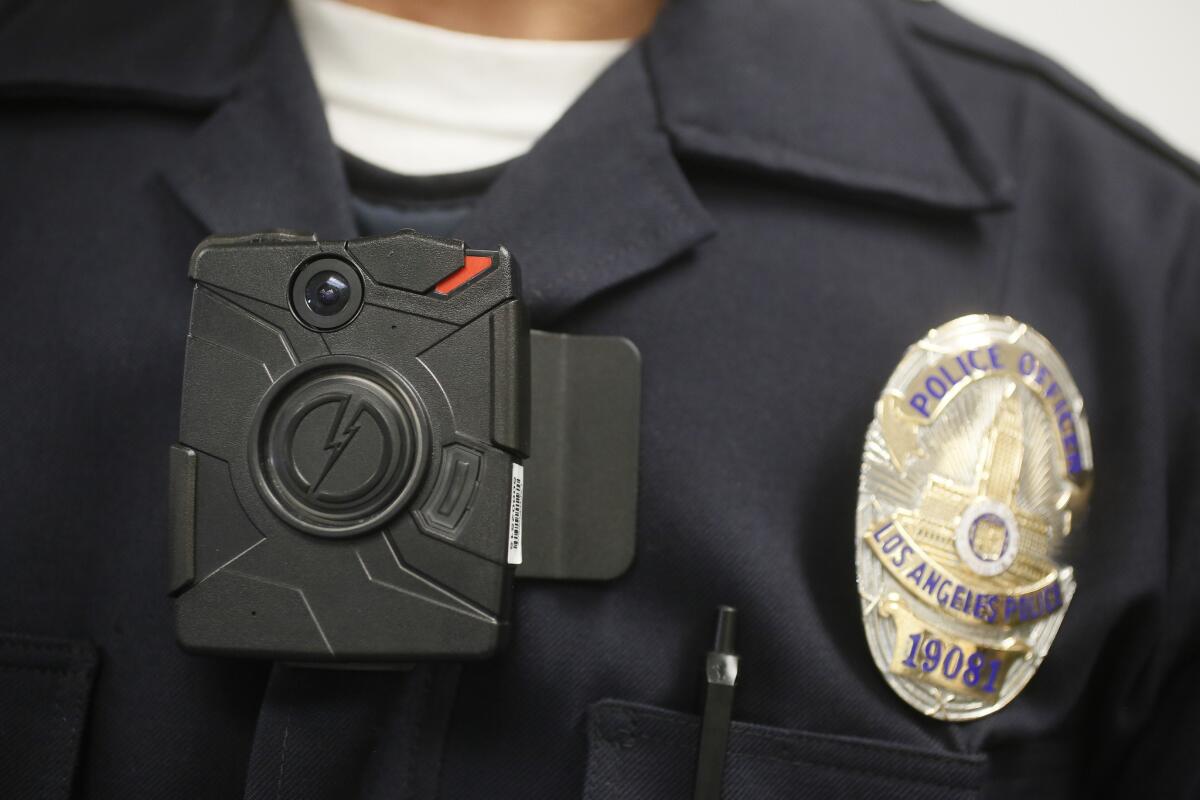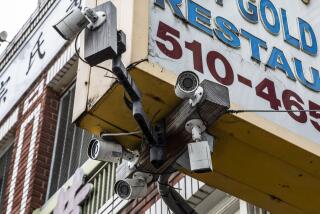California lawmakers act on police cameras, elephant ivory

A Los Angeles Police officer wears a body camera during a demonstration for media.
The state Senate on Wednesday approved legislation aimed at getting police agencies throughout California to adopt effective controls when having officers wear body cameras to record interactions with the public.
The bill by Assemblyman Freddie Rodriguez (D-Pomona) would have local agencies follow “best practices” in establishing procedures, including the assignment of an officer’s supervisor to download recorded data in cases where there is a shooting or other use of force.
“This is a good bill, a first step in the process of achieving uniformity,” said Sen. Ben Hueso (D-San Diego). “It includes recommendations to ensure the security and integrity and reliability of the data, how it’s downloaded and how it’s stored.”
Sen. Jim Nielsen (R-Gerber) supported AB 69 but said he wanted stricter safeguards on who gets to see videotape in use-of-force incidents.
“What we dare not have happen is have our officers carrying cameras and the minute of an incident that [video] is turned over to the news media and the whole case is tried that night on the evening news,” Nielsen told his colleagues before the 40-0 vote, which sends it back to the Assembly for consideration of amendments.
With citizens also recording police encounters, the Senate also approved a bill by Assemblyman Reginald Jones-Sawyer (D-Los Angeles) that would make it a felony for a police officer to destroy or alter video evidence. The bill was sent to Gov. Jerry Brown.
“The public has a right to record the police and we need to send a clear message that any law enforcement official who tries to destroy this evidence will be punished” said Jeff Thoma, president of the California Attorneys for Criminal Justice regarding AB 256.
The Senate also voted Wednesday to approve a bill that would prohibit people in California from buying, selling or possessing with intent to sell elephant ivory and rhinoceros horns, closing a loophole that allows transactions involving products purchased before 1977.
The U.S. and California both have bans on importing ivory. But the grandfathering of “antique ivory” makes it difficult to enforce current bans because it is hard to prove the age of ivory and horns, according to Sen. Ricardo Lara (D-Bell Gardens).
Lara said 96 elephants are killed every day. “We are seeing a poaching crisis that has the potential to impact entire species of elephants and rhinos,” Lara told his colleagues.
However, some Republicans, including Sen. Jeff Stone of Murrieta, said the proposed law is not needed because most of the purchase of ivory happens in China and other Asian countries. Stone said the bill would make it difficult for those who legally purchased ivory before 1977 to sell or keep it.
“This is nothing more than feel-good legislation that is going to make criminals out of law-abiding citizens in California,” Stone said before the 26-13 vote, which sends the bill by Assembly Speaker Toni Atkins (D-San Diego) back to the Assembly for action on amendments.
Sen. Mark Leno (D-San Francisco) disputed Stone’s criticism that the bill is just a “feel-good” measure.
“The slaughter of elephants is so severe we may not have them a generation from now,” Leno said.
Follow @mcgreevy99 on Twitter
More to Read
Start your day right
Sign up for Essential California for news, features and recommendations from the L.A. Times and beyond in your inbox six days a week.
You may occasionally receive promotional content from the Los Angeles Times.







